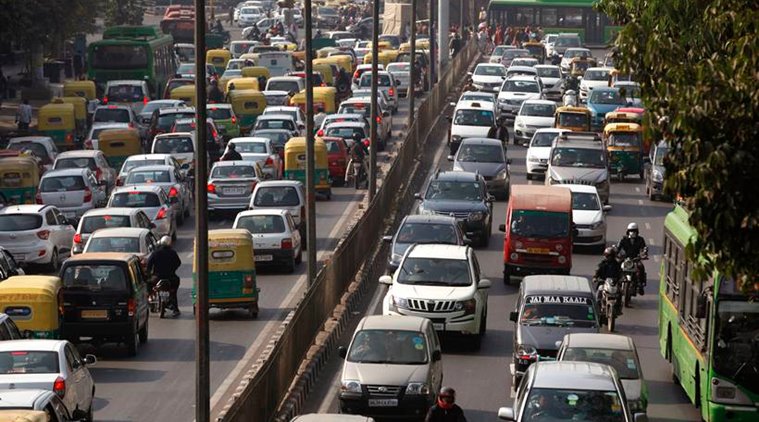Stay updated with the latest - Click here to follow us on Instagram
From 10,167 a month to 1,651, how SUV, small diesel car sales fell sharply in Delhi
In the last year, the National Green Tribunal (NGT) and the Supreme Court have issued stringent orders to curb diesel use in Delhi.
 In response to an RTI application filed by The Indian Express, the Delhi transport department disclosed that registration of private or non-transport diesel vehicles has fallen steadily from 17,588 in January, 2015 to 7,023 in April, 2016.
In response to an RTI application filed by The Indian Express, the Delhi transport department disclosed that registration of private or non-transport diesel vehicles has fallen steadily from 17,588 in January, 2015 to 7,023 in April, 2016.
The Supreme Court ban on diesel vehicles was only on those with engine capacity above 2,000 cc but data from an RTI response shows a sharp drop in registration of all diesel vehicles in Delhi, including those not affected by the ban.
In response to an RTI application filed by The Indian Express, the Delhi transport department disclosed that registration of private or non-transport diesel vehicles has fallen steadily from 17,588 in January, 2015 to 7,023 in April, 2016. The data also shows a 40 per cent dip in registrations in the first quarter this year compared to 2015.
[related-post]
Watch Video: What’s making news
In the last year, the National Green Tribunal (NGT) and the Supreme Court have issued stringent orders to curb diesel use in Delhi. While the NGT, on April 7, 2015, banned diesel vehicles older than 10 years from plying on the roads, the Supreme Court in December, 2015 banned registration of diesel vehicles with engine capacity of over 2000 cc. In May this year, the top court reiterated that diesel taxis would eventually have “to go”.

Diesel has been termed a dirty fuel for the hazardous fumes it emits on combustion. The exhaust can cause cancer and worsen existing allergies and conditions like asthma and irritation in the nose and lung tissue.
In 2012, the World Health Organisation (WHO) moved diesel up from its two-year-old position of “probable carcinogen” (Group 2A) in the risk category to “known carcinogen” (Group 1) for lung cancers. According to All India Institute of Medical Sciences, of around 13,000 new cancer cases each year, almost one-third are of non-smokers. Doctors at AIIMS attributed these cases to diesel fumes.
While the Supreme Court ban affects diesel vehicles with an engine capacity greater than 2,000 cc, the transport department data shows consumers are moving away from diesel vehicles under 2000 cc as well. The data also shows that overall vehicle registrations (petrol, diesel and CNG) have remained the same. This means the number of new cars on Delhi roads continues to increase, but consumers now prefer petrol.
Registration of private diesel vehicles below 2000 cc engine capacity in the first quarter between January and April in 2015 was 56,044. Total registrations in the same period this year dropped to 34,312 — a 39 per cent drop.
The transport department registered 17,588 diesel vehicles in January 2015. In January, 2016, registrations fell to 8,710 by almost 50 per cent as compared to January 2015. The government on an average registered 12,527 private diesel vehicles below 2000 cc engine capacity per month through 2015. Registrations fell to 7,193 in 2016 (figures calculated until May 2016).
Compared to 10,440 in the months preceding the ban, SUV registrations fell to just 87 since January 2016. The only diesel vehicles above 2000 cc that are registered now are emergency and Delhi Jal Board vehicles as allowed by the Supreme Court.
Market players like Maruti Suzuki also reinforced the fact that people were shifting to petrol as the preferred fuel. A Maruti Suzuki spokesperson said, “In the last few months, there has been an accelerated change in demand in favour of petrol vehicles, especially in compact cars. But in segments like sedans and compact UVs and MUVs, diesel continues to be the preferred fuel.”
Experts and officials at the transport department cite other possible reasons for the drop in registrations. “The Supreme Court bench on January 6 said the government was to phase out all diesel vehicles older than 10 years. And the bench also reinforced that all taxi operators and app-based cab services had to switch to CNG by March, 2016. These measures have sent out a message,” a government official said.
Automobile sector experts also cited the shrinking gap between prices of diesel and petrol as a plus point for petrol-fuelled cars which are cleaner. Experts also attributed the fall to the courts’ and government’s war on diesel-fuelled vehicles in the fight against pollution.
“The dieselisation of transport has seen a reversal over the last one-and-half years and more. Court orders and policy implementations like odd-even have instilled a fear psychosis regarding diesel. People feel petrol is a safer fuel and they fear diesel will eventually have to go,” an analyst at Motilal Oswal Financial Services Ltd said.







